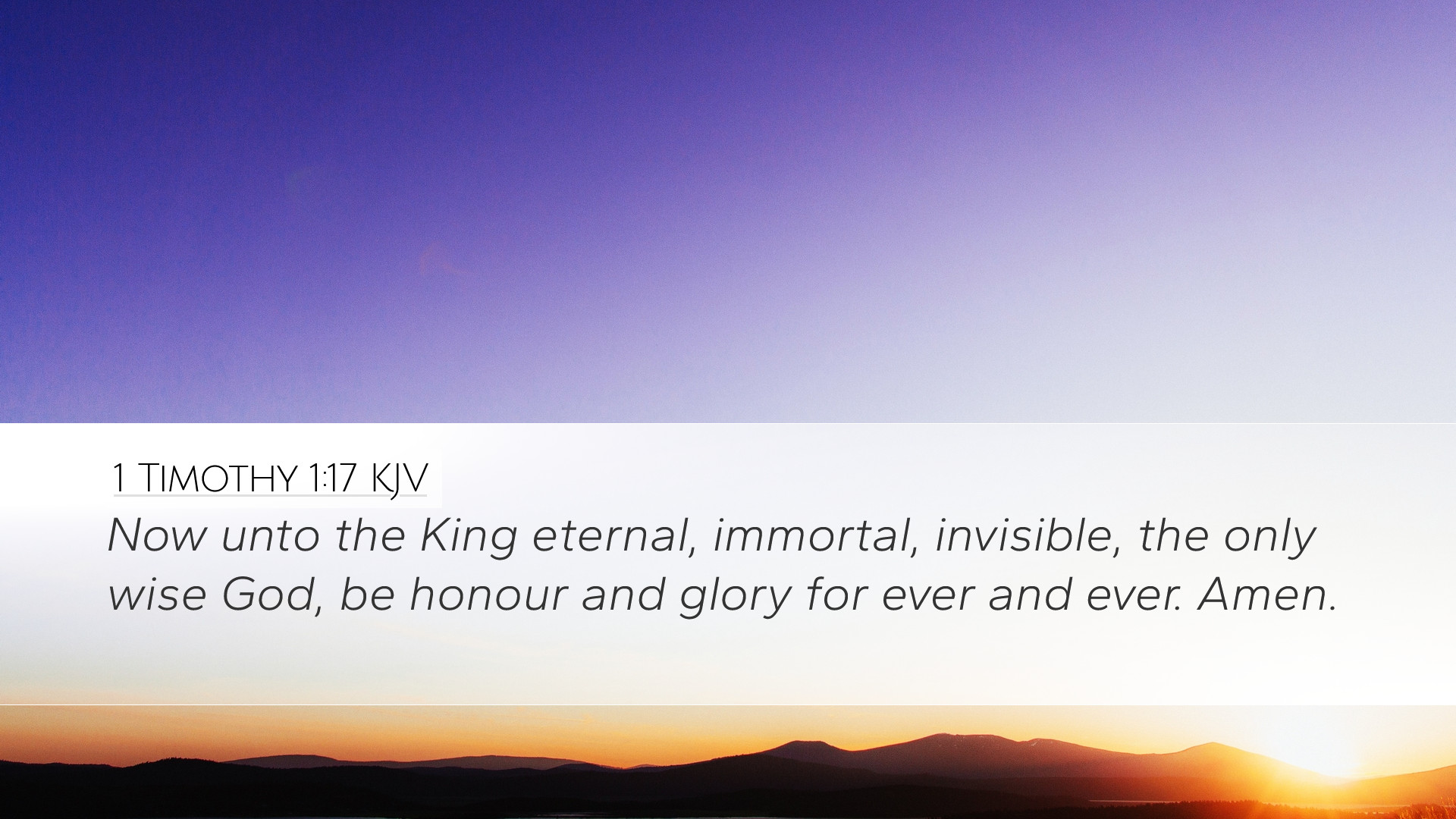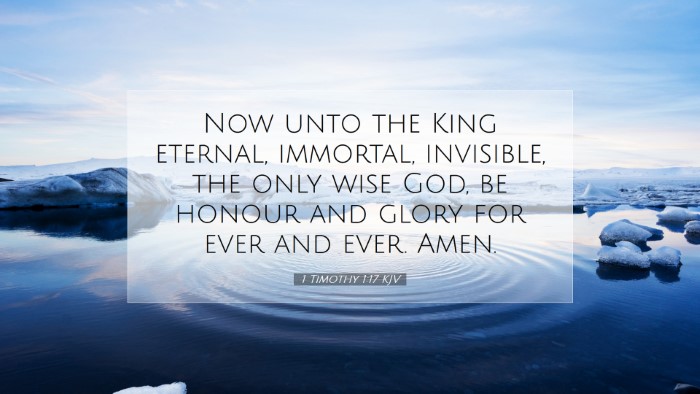Old Testament
Genesis Exodus Leviticus Numbers Deuteronomy Joshua Judges Ruth 1 Samuel 2 Samuel 1 Kings 2 Kings 1 Chronicles 2 Chronicles Ezra Nehemiah Esther Job Psalms Proverbs Ecclesiastes Song of Solomon Isaiah Jeremiah Lamentations Ezekiel Daniel Hosea Joel Amos Obadiah Jonah Micah Nahum Habakkuk Zephaniah Haggai Zechariah Malachi1 Timothy 1:17
1 Timothy 1:17 KJV
Now unto the King eternal, immortal, invisible, the only wise God, be honour and glory for ever and ever. Amen.
1 Timothy 1:17 Bible Commentary
Commentary on 1 Timothy 1:17
1 Timothy 1:17 states: "Now unto the King eternal, immortal, invisible, the only wise God, be honor and glory forever and ever. Amen."
Introduction
This verse serves as a doxology that magnifies the majesty of God, concentrating on His eternal nature and sovereignty. The Apostle Paul emphasizes various attributes of God that are fundamental to the Christian faith and beneficial to believers in their understanding of God’s character.
Insights from Matthew Henry
-
God’s Sovereignty:
Matthew Henry elaborates on God as the “King eternal,” highlighting His supreme authority. The phrase suggests that God's reign is everlasting, transcending all temporal powers and kingdoms.
-
Immortal and Invisible:
Henry points out the dual attributes of God’s immortality and invisibility. He emphasizes that God exists beyond the confines of time and space, making Him fundamentally different from created beings.
-
The Only Wise God:
Henry underlines the necessity of recognizing God as the only source of true wisdom. This acknowledgment compels believers to depend wholly on His guidance in their lives.
-
Ascription of Glory:
The doxology aspect of this verse calls the faithful to ascribe honor and glory to God. Henry underscores that this recognition should be both individual and communal, fostering worship and reverence within the church.
Insights from Albert Barnes
-
King Eternal:
Barnes highlights the idea of God’s eternal kingship, noting that unlike earthly rulers, His reign has no beginning or end, providing assurance of His ultimate authority over all creation.
-
Nature of God:
Barnes emphasizes that God’s immortality proves His transcendence over death, a significant comfort for believers facing existential struggles.
-
Invisible Essence:
So profound is God's invisibility that it requires faith to attain a true understanding of His nature. Barnes insists that while humans cannot see God directly, His creations reveal His character.
-
Worship and Glory:
Barnes stresses that the response to God’s attributes is worship and glory, which reflects the believer's acknowledgment of God’s sovereignty in their lives.
Insights from Adam Clarke
-
Theological Reflection:
Clarke provides a theological reflection on the verse, discussing how the terms “immortal” and “invisible” stress the essence of God's nature, promoting a profound understanding of His divinity.
-
God’s Uniqueness:
He notes that calling God the “only wise God” affirms that all wisdom resides in Him alone, differentiating Him from any other deities worshipped by humanity.
-
The Eternal King:
Clarke elaborates on the phrase “King eternal,” encouraging believers to derive confidence and hope from the knowledge that God’s kingship is not only eternal but also benevolent.
-
Doxological Life:
Finally, Clarke asserts the importance of doxology in the life of a believer, contending that such acknowledgment should lead to a life dedicated to glorifying God in every aspect.
Theological Implications
The theological richness of 1 Timothy 1:17 serves as a foundation for understanding God’s character and His relationship with humanity. The declaration that God is eternal and immortal offers deep reassurance to Christians facing trials, emphasizing that He remains unchanged and faithful throughout time.
Moreover, recognizing that God is the “only wise” encourages believers to trust in His providential wisdom rather than their understanding, fostering humility and reliance on divine guidance.
Ultimately, the exhortation to give honor and glory to God reflects the appropriate response of reverence and worship that believers should cultivate within their lives, encouraging both individual acts of worship and collective gatherings focused on glorifying God.
Conclusion
1 Timothy 1:17 serves not only as a passage of praise but as a reminder of God’s nature and the believer’s response to Him. Insights from Matthew Henry, Albert Barnes, and Adam Clarke collectively emphasize the importance of understanding God's eternality, wisdom, and glory. For pastors, students, theologians, and Bible scholars, this verse invites deep reflection on personal worship and the character of God as they fulfill their respective callings in the ministry and study of God’s Word.


